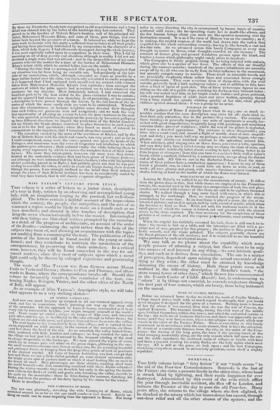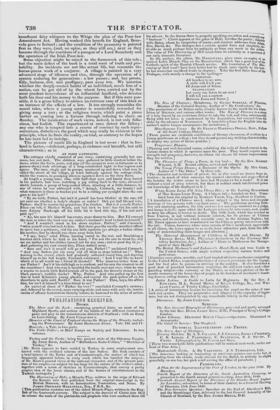BEN E VOL A.
Tins little volume brings " fairy fiction" if not "truth severe" to the aid of the Poor-law Commissioners. Benevola is the last of the Fairies : she visits a peasant family in the olden time, whose head is struck blind by lightning, and their rustic happiness for ever destroyed. Admonished by this event of the evils which afflict the poor through inevitable accident, she flies off to London, and induces the Premier of the day to pass the old Poor-law. Many years after, she returns to the village where she first alighted, to be shocked at the misery which her benevolence has caused, through out-door relief and all the other abuses of the system ; and the
beneficent fairy whispers to the Whigs the plan of the Poor-law Amendment Act. Having worked this benefit for England, Bene- vola goes to Ireland ; and the condition of the peasantry is painted first as they were, (and, we opine, as they still are,) next as they become through the exertions of a paragon of a Lord Somebody and the operation of the Irish Poor-law. Some objection might be raised to the framework of this talc; but the main defect of the book is a total want of truth and pro- • bability. Its incidents are not like actual life, but resemble the hocus-pocus work of a conjuror. A village is painted in a very advanced stage of idleness and vice, through the operation of a system enduring for generations : a law passes ; and, hey presto, folly, laziness, dirt, and profligacy, pass away too. We question whether the deeply-rooted habits of an individual, much less of a nation, can be got rid of by the wisest laws, carried out by the most prudent benevolence of an influential landlord, who devotes both his time and his money to the purpose. But if this were pos- sible, it is a gross fallacy to adduce an extreme case of this kind as an instance of the effects of a law. It too strongly resembles the moral tales, where a young master is wonderfully rewarded for giving away a tart ; or the religious tracts, which paint a pious barber as coming into a fortune through refusing to shave on Sunday. The inculcation of such views, indeed, is not only falla- cious, but foolish. The experienced at once detect the fallacy: any one who is tempted into a course of' conduct by such repre- sentations, disbelieves the good which may really be existent in the principle, when he finds the reality, on trial, so contrary to the hopes he has been led to indulge. The picture of rustic life in England is but so-so : that in Ire- land is better,—deficient, perhaps, in richness and breadth, but still characteristic ; as in
AN IRISH GATHERING.
The cottages chiefly consisted of one story, containing generally but one room, low and dark. The children were gathered in little clusters before the doors, whilst the fowls, goats, and pigs (if the occupiers were so fortunate as to possess them) took advantage of a long-established right to free ingress and egress. 'f he men, singly and in groups, sauntered up and down what may be called the street of the village, or leant listlessly against the cottage-walls, whilst the women, in gossiping idleness squatted down on the dirty floors. At length a young man, who, with half-shut eyes and hands deep buried in his pockets, had been watching a pig rolling itself in the mire, advanced slowly towards a group of long-coated idlers, standing at a little distance, by one of whom he was addressed with, " Arragh, Cormeck, my beauty! and what manners is those as teaches yes to be a risting yer eyesight afore the sun goes to his bed ? " By me faith, hither, but isn't it yerself has been blinkin' at the sun, till yer cant sae whether a body's sleapin or wakin ? eels yer dull blessed wits, Fattier; the% be wantin the grindstone, I'm thinkin. But is it yerself, rather Flinn can tell, if Misther Smith, and bail luck to him ! has tukohis oath to turn Johnny Mackeogh off his little bit iv land this day, if his rint isn't paid up?" " Ay, bin sure it's himself has sworn, more shame to him. But I'd counsel the man as takes the land over my sisther's husband's head to look to himself."
" And I wouldn't stand in his shoes anyhow, Father," said Cormack, "whin yersell cries bad luck to bins. But there goes the meally-mouthed officer to serve bins a quittance, wild his one little.squintin eye always a lookin afther his brother, fear he should run cane away from him."
" I say, boys," cried Flinn, turning round to the rest, and flourishing a knotted stick which he held in his hand, " I'm not the one to stand by, end sae me sisther and her chatter turned out for any man; end so good day to ye." And gathering his coat round him, Flinn stalked away. " Sure and isn't it tries& will go wid you, Father ! " exclaimed Cormack. " And may Sathan jist tin away wid all thim as stops behind me ! ' Then turning to the crowd, which had gradually collected round him, and drawing
himself up to his fell height, Cormack continued : 4 And I wad like to know
which of us all would sae a friend ill.thrated ? Who deserves better from us nor Father? Isn't it his shillelagh as is readiest, and his arm the stoutest in all the counthree ? And who was it tumbled the beadle over and over, whin be was a wantin to march little Rob Camels off to the gaol, fur thrown' stones at the black parson's waddlin ducks? Why, Father. And who pulled up the first tree in Lord Kiltnain's young Omani, and carried the park-palins off on his shoutbers to spite ould Smith ? Sure it was Father ! Thin, boys, lits after him, fur isn't it himself 's a true friend to us?"
An universal shout of " Father fur iver! " concluded Cormack's oratory; and, followed by the crowd, some carrying sticks and some with only the instru- ments of offence bestowed on flimsily nature, he hastened to the scene of action.



























 Previous page
Previous page